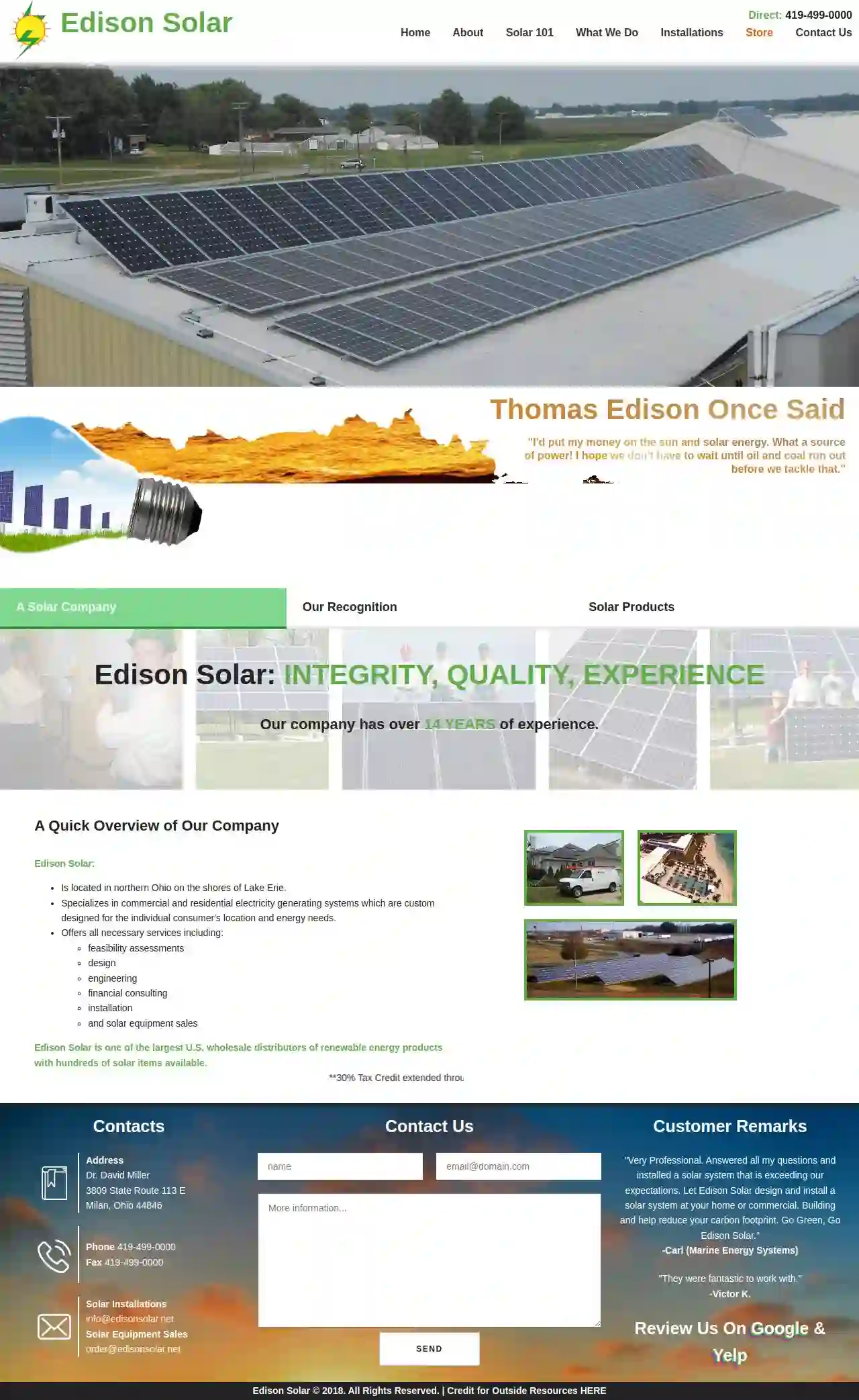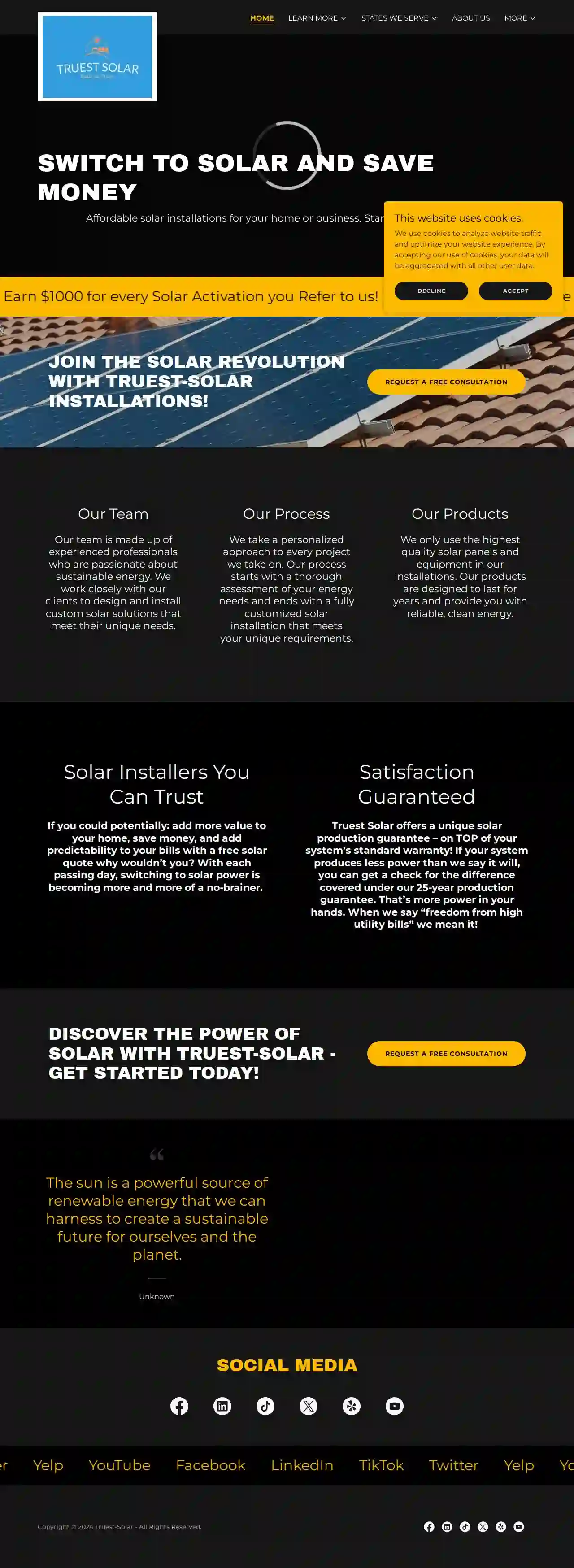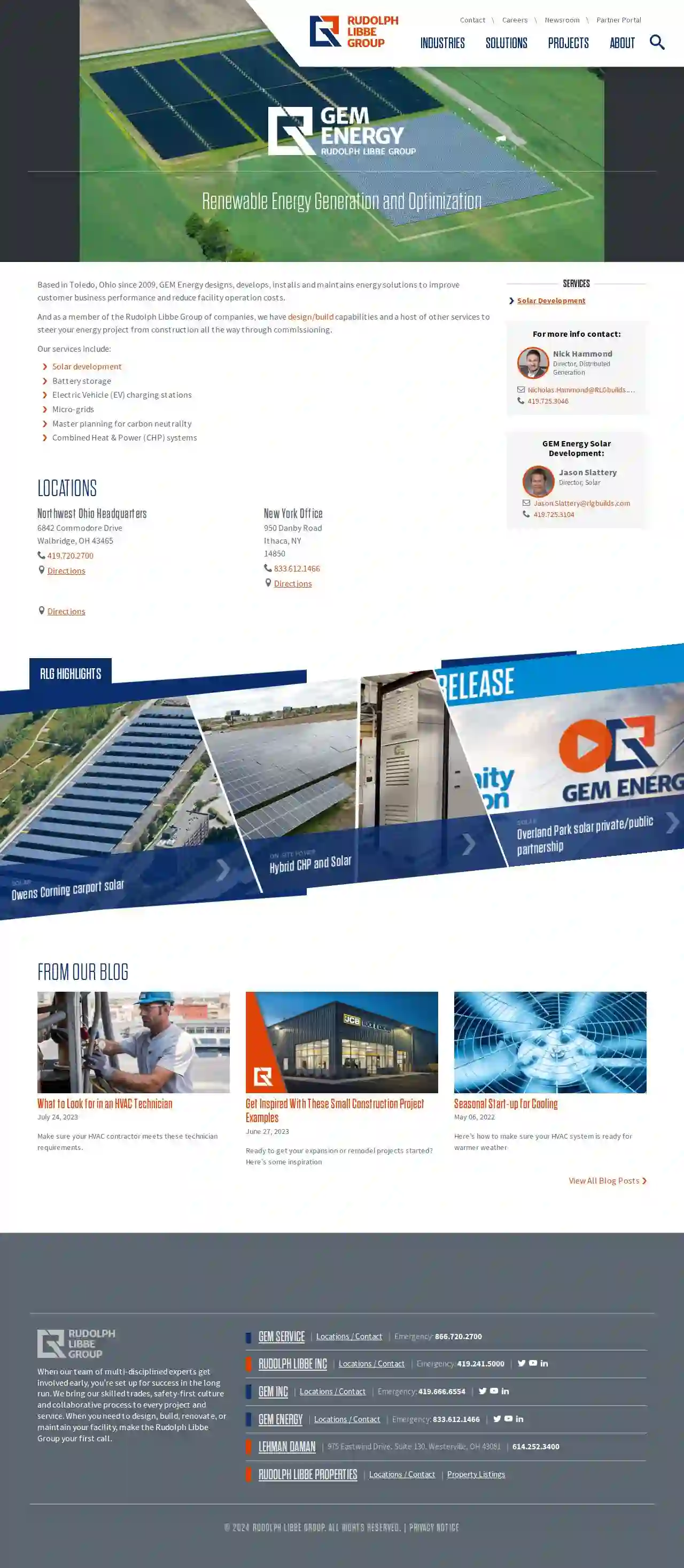Solar Installers Canal Fulton
Best Residential Solar Installers in Canal Fulton
Receive up to 3 Solar Panel Installers quotes for your project today! Compare profiles, reviews, accreditations, portfolio, etc... and choose the best service.

Solar Energy Solutions
4.611 reviews1038 Brentwood Court, Lexington, 40370, USSolar Energy Solutions is a local, family-owned solar panel installer that’s built on quality. We’ve been in business since 2006 and are the oldest and most experienced solar installer in the region. We are a values-driven company doing what’s best for our customers and what’s right for our planet every single day.
- Services
- Why Us?
- Accreditations
- Our Team
- Testimonials
- Gallery
Get Quote
Edison Solar, Inc.
4.215 reviews3809 State Route 113 E, Milan, 44846, USEdison Solar is a company located in northern Ohio on the shores of Lake Erie, specializing in commercial and residential electricity generating systems. They offer all necessary services including feasibility assessments, design, engineering, financial consulting, installation, and solar equipment sales. Edison Solar is one of the largest U.S. wholesale distributors of renewable energy products with hundreds of solar items available. They have been in the alternative energy business since 2007 and have developed to the point of having all the essential pieces; panels, racking, inverters, technical and labor to undertake megawatt projects.
- Services
- Why Us?
- Accreditations
- Our Team
- Testimonials
- Gallery
Get Quote
Solar Power & Light, LLC.
4.413 reviewsMiamisburg, Ohio, 2411 Crosspointe Dr, 45342, USSolar Power and Light, LLC (SP&L) is an integrated renewable energy company headquartered near Dayton, Ohio. Founded in 2010, SP&L is dedicated to helping clients 'TAKE CHARGE' of their future by cutting costs, hedging risk, and meeting sustainability/energy goals. SP&L offers a range of services including Solar Repair, Monitoring and On-Call Programs, Insurance Claim Re-Installs, and Solar and Battery Upgrades. The company also manages multi-million dollar technology intensive projects and provides O&M, SREC, and PPA Management services for numerous solar fleet owners.
- Services
- Why Us?
- Accreditations
- Our Team
- Testimonials
- Gallery
Get Quote
Truest-Solar
Cincinnati, USTruest-Solar is a company dedicated to making solar energy accessible and affordable for everyone. They believe in a sustainable future and are committed to providing high-quality solar installation services. Their team has over 10 years of experience in the solar installation industry and has successfully completed over 100,000 installations. They offer a personalized approach to every project, starting with a thorough assessment of energy needs and ending with a fully customized solar installation.
- Services
- Why Us?
- Gallery
Get Quote
Solar Tint
4.7185 reviewsCincinnati, OH, 5050 Montgomery Rd, 45212, USSolar Tint is a leading provider of window tinting solutions for residential and commercial properties. With locations in Ohio, Kentucky, Indiana, and Tennessee, they offer a range of services including sun control, safety and security, privacy, and custom graphics. Their team of certified installers is dedicated to enhancing the comfort, privacy, and energy efficiency of their clients' spaces.
- Services
- Why Us?
- Accreditations
- Our Team
- Testimonials
- Gallery
Get Quote
EcoHouse Solar
570 reviews123 Solar Street, Columbus, Ohio, 43201, USEcohouse Solar is a leading solar panel company in Central Ohio, specializing in residential and commercial solar installations. With over 20 years of experience, they offer customized solar panel designs, handle all necessary permits, and provide personalized service throughout the installation process. Ecohouse Solar aims to make solar energy affordable through flexible financing options and tax incentives, increasing property value while lowering energy costs.
- Services
- Why Us?
- Accreditations
- Our Team
- Testimonials
- Gallery
Get Quote
Smucker's Energy OH LLC
Kinzers, PA, 5117 Old Philadelphia Pike, 17535, USSmucker's Energy is a solar energy solutions provider for offgrid cabins, homes, farms, and businesses. They offer a range of services including solar power installation, incentives, and rebates. Their team has over 20 years of experience in installing solar systems and offers top-notch customer service. They operate in the Mid-Atlantic and Northeastern states, including Pennsylvania, Maryland, Delaware, Ohio, and the Virginias.
- Services
- Why Us?
- Accreditations
- Our Team
- Testimonials
- Gallery
Get Quote
GEM Energy
51 reviews6842 Commodore Drive, Toledo, 43465, USRenewable Energy Generation and Optimization. Based in Toledo, Ohio since 2009, GEM Energy designs, develops, installs and maintains energy solutions to improve customer business performance and reduce facility operation costs. As a member of the Rudolph Libbe Group of companies, we have design/build capabilities and a host of other services to steer your energy project from construction all the way through commissioning.
- Services
- Why Us?
- Accreditations
- Our Team
- Testimonials
- Gallery
Get Quote
BC Solar
57 reviews777 Busch Ct, Columbus, 43229, USBC Solar is dedicated to providing sustainable and reliable solar energy solutions. They believe in the power of solar energy and its numerous benefits, including long-term savings, reduced reliance on fossil fuels, and increased energy independence. BC Solar offers customized solar systems designed to meet the specific needs of each customer, ensuring a seamless transition to solar power. Their team is passionate about educating customers on the advantages of solar energy and providing top-notch service from installation to ongoing support.
- Services
- Why Us?
- Accreditations
- Our Team
- Testimonials
- Gallery
Get Quote
SunWatts
3.812 reviewsSunWatts HQ, Suite 100, 123 Solar Way, Beverly Hills, 90210, USSunWatts is a clean energy company that helps home and business owners achieve a more sustainable lifestyle by utilizing modern solar panel and battery technology. They offer a range of services including consulting and design, solar financing, and installation. With over 15 years in business, SunWatts has generated more than $25 million in utility savings, equivalent to 6 million trees planted.
- Services
- Why Us?
- Accreditations
- Our Team
- Testimonials
- Gallery
Get Quote
Over 4,210+ Solar Businesses on our directory
Our solar installers operate in Canal Fulton and beyond!
SolarCompaniesHub has curated and vetted Top Solar Contractors near Canal Fulton. Find a trustworthy business today.
Frequently Asked Questions About Solar Installers
- Cash Purchase: The most straightforward option, providing the greatest long-term savings but requiring a larger upfront investment.
- Solar Loans: Loans specifically designed for solar installations, often with favorable terms and interest rates.
- Solar Leases: A third-party company owns the system and leases it to you, allowing you to go solar with little or no upfront cost, but you won't own the system or receive tax benefits.
- Power Purchase Agreements (PPAs): Similar to leases, but you pay for the electricity generated by the system, not the system itself.
- Home Equity Loans or Lines of Credit: Borrow against the equity in your home.
- Keep Panels Clean: Clean panels periodically to remove dirt, debris, and bird droppings, which can reduce efficiency. Rainfall usually cleans panels adequately, but you might need to hose them down occasionally.
- Visual Inspections: Regularly inspect panels for signs of damage, loose wiring, or other issues.
- Professional Maintenance: Consider having a professional solar installer inspect your system every few years to ensure optimal performance.
- Draw electricity from the grid when your solar panels aren't producing enough power (e.g., at night)
- Sell excess solar electricity back to the grid through net metering.
How can I finance my solar panel installation?
How do I maintain my solar panels?
Do I need to replace my roof before installing solar panels?
What is the difference between grid-tied and off-grid solar systems?
How can I finance my solar panel installation?
- Cash Purchase: The most straightforward option, providing the greatest long-term savings but requiring a larger upfront investment.
- Solar Loans: Loans specifically designed for solar installations, often with favorable terms and interest rates.
- Solar Leases: A third-party company owns the system and leases it to you, allowing you to go solar with little or no upfront cost, but you won't own the system or receive tax benefits.
- Power Purchase Agreements (PPAs): Similar to leases, but you pay for the electricity generated by the system, not the system itself.
- Home Equity Loans or Lines of Credit: Borrow against the equity in your home.
How do I maintain my solar panels?
- Keep Panels Clean: Clean panels periodically to remove dirt, debris, and bird droppings, which can reduce efficiency. Rainfall usually cleans panels adequately, but you might need to hose them down occasionally.
- Visual Inspections: Regularly inspect panels for signs of damage, loose wiring, or other issues.
- Professional Maintenance: Consider having a professional solar installer inspect your system every few years to ensure optimal performance.
Do I need to replace my roof before installing solar panels?
What is the difference between grid-tied and off-grid solar systems?
- Draw electricity from the grid when your solar panels aren't producing enough power (e.g., at night)
- Sell excess solar electricity back to the grid through net metering.